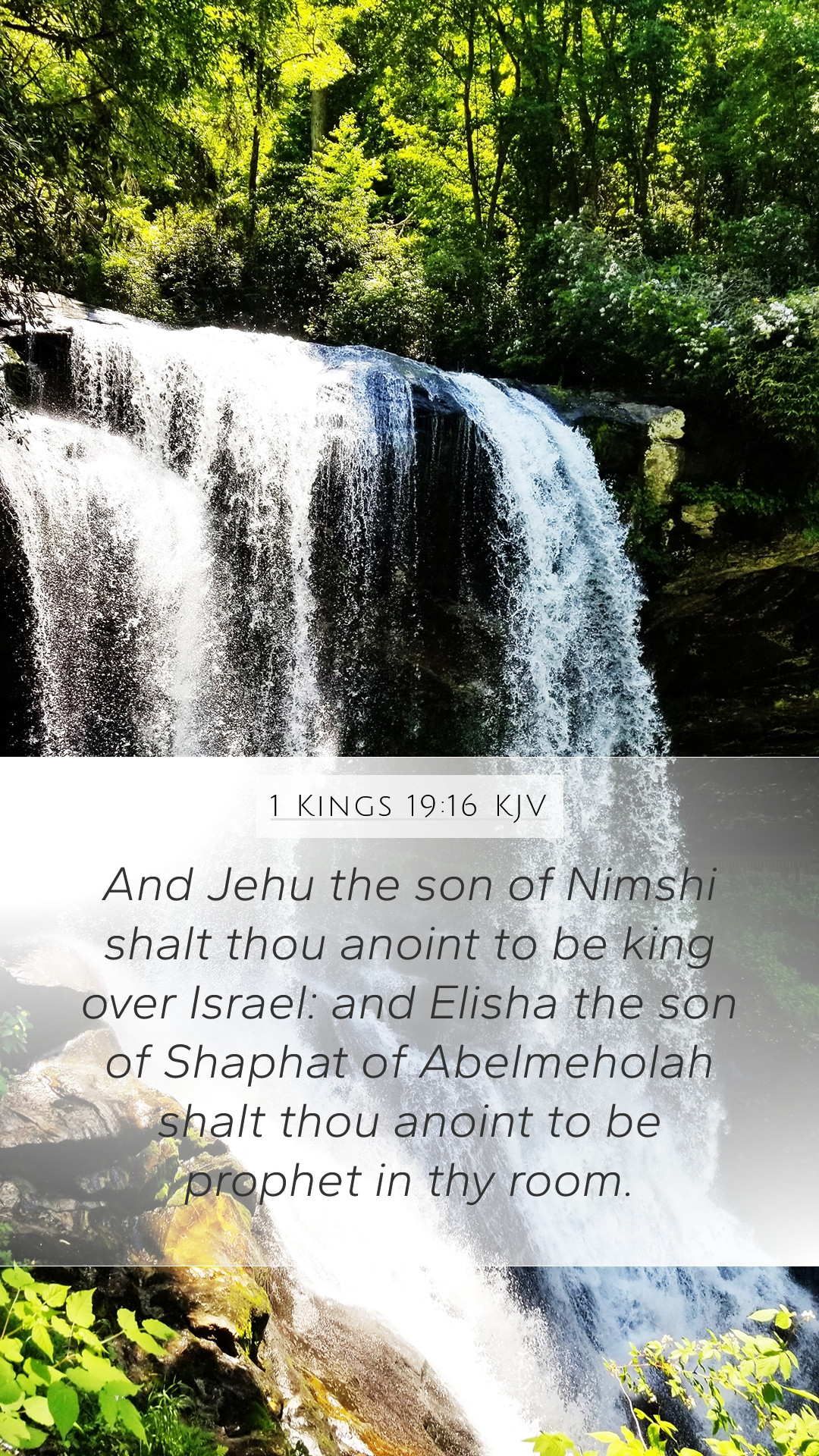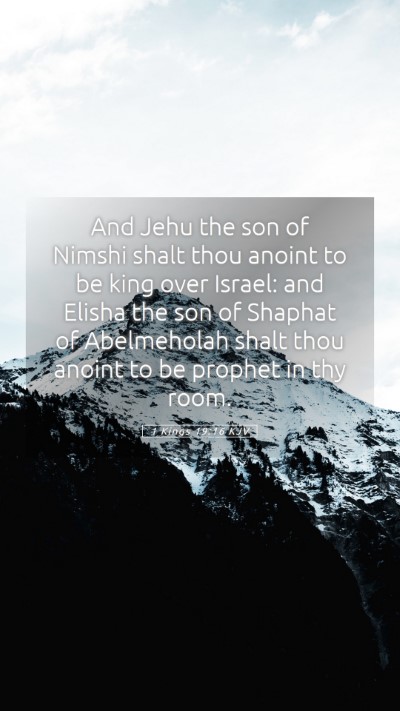Old Testament
Genesis Exodus Leviticus Numbers Deuteronomy Joshua Judges Ruth 1 Samuel 2 Samuel 1 Kings 2 Kings 1 Chronicles 2 Chronicles Ezra Nehemiah Esther Job Psalms Proverbs Ecclesiastes Song of Solomon Isaiah Jeremiah Lamentations Ezekiel Daniel Hosea Joel Amos Obadiah Jonah Micah Nahum Habakkuk Zephaniah Haggai Zechariah Malachi1 Kings 19:16 Meaning
What is the meaning of 1 Kings 19:16?
And Jehu the son of Nimshi shalt thou anoint to be king over Israel: and Elisha the son of Shaphat of Abelmeholah shalt thou anoint to be prophet in thy room.
1 Kings 19:16 Bible Verse Meaning
Understanding 1 Kings 19:16 - A Comprehensive Bible Verse Commentary
In the journey of Bible study, understanding the significance of various verses is crucial. One such verse is 1 Kings 19:16, which depicts a pivotal moment in the life of the prophet Elijah. The verse states:
"And Jehu the son of Nimshi shalt thou anoint to be king over Israel: and Elisha the son of Shaphat of Abelmeholah shalt thou anoint to be prophet in thy room."
General Overview
This verse comes at a time when Elijah, feeling despondent and alone, receives instructions from God. The anointing of Jehu symbolizes divine intervention in the political realm, while Elisha’s anointing signifies the continuity of prophetic ministry. The essence of the verse not only illustrates God’s sovereignty but also emphasizes the importance of succession in leadership.
Insights from Bible Commentaries
Matthew Henry’s Commentary
Matthew Henry highlights that this command to anoint new leaders underscores God's control over nations and His plan for His people. He emphasizes that these anointings are critical for the coming judgment on Ahab’s house, showcasing God's intention to cleanse Israel from corruption. Additionally, Henry notes that the selection of Elisha signifies God's provision for His prophets, ensuring that Elijah's mission and spiritual influence would continue.
Albert Barnes' Notes on the Bible
Albert Barnes elaborates on the significance of both Jehu and Elisha. He points out that Jehu will bring about profound changes by responding to God's judgment against idolatry in Israel. Barnes mentions that Elisha, by succeeding Elijah, represents a new wave of prophetic energy and a continuation of Elijah's ministry. The emphasis here is on the operational flow of God’s purpose through appointed leaders, which adds depth to understanding God's plan through history.
Adam Clarke’s Commentary
Adam Clarke provides a linguistic and cultural analysis of the terms used in this verse. He discusses the historical context of Kings and the significance of anointing in Hebrew culture, reflecting its gravity in religious and political dimensions. Clarke stresses that God's instructions to Elijah serve a dual purpose: to establish judicious governance in Israel and to reinforce the authority of prophetic voices in their historical context.
Key Themes and Lessons
- Divine Sovereignty: God orchestrates the rise and fall of leaders according to His divine will.
- Importance of Succession: Leadership transitions are vital for the continuity of spiritual and administrative duties.
- Judgment and Mercy: God’s actions within the anointing of Jehu and Elisha illustrate His judgment against sin while simultaneously showing mercy by continuing His prophetic voice.
Applications of 1 Kings 19:16
For those engaging in Bible study groups or personal reflection, this verse prompts several applications:
- Leadership in Faith: Understanding how God prepares and appoints leaders can inspire current leaders to cultivate their callings responsibly.
- Listening to God’s Voice: Recognizing God’s direction in our lives as we navigate challenges and transitions.
- Commitment to God’s Mission: The necessity of standing firm against societal challenges as demonstrated by both Elijah and Elisha.
Bible Cross References
1 Kings 19:16 relates to several other significant scriptures:
- 1 Kings 19:17: Discussion of Jehu’s future actions and their implications for Ahab's legacy.
- 2 Kings 9:1-3: The actual anointing of Jehu by Elisha, fulfilling the prophecy.
- Isaiah 61:1: The theme of anointing as a divine calling in ministry.
Conclusion
In summary, 1 Kings 19:16 encompasses vital themes of divine orchestration, leadership succession, and God's enduring commitment to His people. Understanding this verse through a combination of textual analysis and commentary insights enriches our Bible verse interpretations and enhances our overall Bible study insights. For those seeking to delve deeper into Biblical exegesis, this verse serves as an excellent case study on how God works through men and women across history to fulfill His divine purpose.


